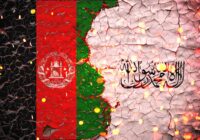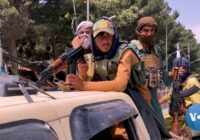In this edition of The Interview, Fair Observer talks to Shukria Dellawar, a senior fellow at the Center for International Policy.
Afghanistan has experienced difficult days in its modern history. From 1996 to 2001, it was ruled by the totalitarian Taliban regime. The Taliban are a fundamentalist political movement that enforced an extreme interpretation of Islamic law and caused Afghans a great deal of pain and suffering through massacres, human trafficking, oppression of women and violence against civilians.
The 2001 invasion of Afghanistan by the United States and its allies, which took place in the immediate aftermath of the 9/11 attacks, took a heavy toll on Afghans. But there was a silver lining as the Taliban were removed from power and authority was given to the Afghan people to determine their future through democratic means.
Afghanistan is now an emerging nation, rising from the ashes of war, destruction, internal conflict and foreign intervention. Afghans want a democratic, free and prosperous country, even though they have grievances about mismanagement and a lack of transparency at the government level.
On October 20, 2018, Afghans headed to the ballot box to take part in parliamentary elections. It was the third parliamentary polls since the fall of the Taliban in 2001. The elections were initially scheduled for early 2015, but were delayed due to security concerns and some reforms in the voter registration process. The vote was held under the shadow of threats by the Taliban, and attacks by insurgents saw at least 130 people killed or injured on election day. The primary results were published by Afghanistan’s Independent Election Commission on November 23.
In this edition of The Interview, Fair Observer talks to Shukria Dellawar, a senior fellow at the Center for International Policy, about the recent elections in Afghanistan and the prospects of democracy for the country.
The transcript has been edited for clarity.
Kourosh Ziabari: The parliamentary elections in Afghanistan, the third since the Taliban’s fall in 2001, were recently held and the preliminary results were released in November. Has this been a successful practice of democracy for Afghanistan?
Shukria Dellawar: Elections are a successful measure of democracy only when they can be transparent and considered legitimate by voters. What we see in Afghanistan is that people came out to vote, so clearly Afghans have expressed a desire to have a functional democracy. However, with massive fraud, insecurity and a lack of transparency in the process of elections, it cannot be considered a successful practice of democracy. When the Independent Election Commission (IEC) cannot announce the final winners of the election for weeks because nearly 12,000 complaints have been reported, this can hardly be called a successful practice of democracy.
Ziabari: There were worrying reports emerging from Afghanistan that many people didn’t show up at the ballot box due to security concerns over the Taliban. Is it true that the Taliban’s control over certain parts of the country, their threats of violence and dissemination of fear discouraged thousands of people from voting?
Dellawar: Many voters were discouraged due to security risks, particularly in areas where there is a strong presence of the Taliban. However, other Afghans still risked their lives to come out and vote because they wanted their voices heard. Other factors along with security risks discouraged votes. Due to insecurity, some polling stations didn’t open and others were not properly prepared to process ballots. A new biometric system was announced at the last minute to prevent election fraud, yet the biometric system had its own issues. Some elections staff who were trained to use the system did not show up due to security risks.
Ziabari: Since 2001, some 20 million election cards have been distributed among Afghans while the country has only 12 million eligible voters. This irregularity is a major driver for electoral fraud. Do you think it has particularly affected the recent election? Is it possible to fix this inconsistency with assistance from international organizations?
Dellawar: The extra election cards have definitely negatively impacted the accuracy of vote counts and led to fraud. I believe it can be fixed, but it will require time, patience and investment into training election staff. There is no quick fix, but election issues can be tackled by working with election observers and election watchdog organizations. The IEC would have to investigate all complains and undertake correction measures. Election watchdogs believe the IEC is not equipped to fix things before the scheduled presidential elections of 2019.
Ziabari: Moving on to the upcoming presidential election: Does Ashraf Ghani, who is accused by his critics of authoritarianism and mismanagement, have a chance of being re-elected?
Dellawar: Ghani has lost much support due to his leadership style, which has come under heavy criticism by Afghans. He is considered to be a micro-manager that has surrounded himself by loyalists and is hard to reach by even those officials whom he has appointed to certain positions. The country’s security has suffered under his leadership and even former supporters are looking at other potential candidates to support for 2019. It remains to be seen how the next election will fare for Ghani, but one thing is sure: He has lost considerable support on the ground.
Ziabari: Will talks between the government and the Taliban yield results conducive to peace and stability in Afghanistan? Do you think the Taliban will talk to the government in good faith and are not after blackmailing the administration? What do you think their conditions will be for ending violence against civilians?
Dellawar: Talks can lead to peace when all stakeholders come to the table and are willing to negotiate to end the four decades of violence that millions of innocent Afghans have endured. I believe both the Taliban and the Afghan government are in a stalemate. The violence in Afghanistan is not solely due to the Taliban, but also due to much regional interference as well as heavily military-focused initiatives that have undermined peace. The conflict is definitely at a stalemate because the Taliban have failed to fully take over Afghanistan and the Afghan government and its allies have failed to defeat the Taliban.
So, negotiations are the only way out. However, a neutral third party needs to lead the negotiations, as there is a serious risk when two parties to the conflict begin talking with no intermediary. The United States is party to the conflict and, therefore, not a neutral mediator in talks with the Taliban.
The Taliban are coming into the negotiations from the position of strength due to how they have undermined the government by spreading insecurity. However, the Taliban would need to come under some rules and regulations if they want to be part of a power-sharing deal. Otherwise, the country is ripe to fall into another bloody civil war. Much change and progress has happened in the last 17 years despite the constant violence, and Afghans will refuse to go back to a fundamentalist regime. So, the Taliban would have to compromise on certain previously held positions.
Ziabari: For how long will Afghanistan need military assistance from its Western partners to maintain peace and security in the country and combat terrorism? Do you see any chances it will realize self-sufficiency in the short run or in the years to come?
Dellawar: Afghans will need less military assistance from Western partners if the Western partners will focus on a political solution instead of an endless failed military policy. It is much cheaper to ensure peace than it is to fight an endless war. Afghans have already come to the conclusion that the bloodshed must end and that they will have to talk to each other. However, regional countries must recognize a stable Afghanistan is in their economic and security interest. And Western powers would have to be willing to phase out a complete troop withdrawal, and that timeline needs to be negotiated with the Taliban and the Afghan government.
Afghans want continued support from Western countries, but that support can be for development and reconstruction as well as peacekeeping forces instead of continuing to pursue a failed policy.
Ziabari: Is Afghanistan’s economy going to experience better days? It seems like the cultivation of opium poppy or a job in the security services are the only employment options for many people. How do you see the future for the country’s youths?
Dellawar: Over 70% of the Afghan population is under 35 years old. Due to insecurity and a lack of job opportunities, many Afghans turn to security services for employment. Afghanistan is just as capable as any other country to stand on its feet as it has done historically by being neutral to its neighbors and cultivating good trade relations. Afghanistan’s mineral wealth is estimated at $3 trillion and it has a young workforce. Should peace be established in the country, it has a very solid future.
The views expressed in this article are the author’s own and do not necessarily reflect Fair Observer’s editorial policy.
Support Fair Observer
We rely on your support for our independence, diversity and quality.
For more than 10 years, Fair Observer has been free, fair and independent. No billionaire owns us, no advertisers control us. We are a reader-supported nonprofit. Unlike many other publications, we keep our content free for readers regardless of where they live or whether they can afford to pay. We have no paywalls and no ads.
In the post-truth era of fake news, echo chambers and filter bubbles, we publish a plurality of perspectives from around the world. Anyone can publish with us, but everyone goes through a rigorous editorial process. So, you get fact-checked, well-reasoned content instead of noise.
We publish 2,500+ voices from 90+ countries. We also conduct education and training programs
on subjects ranging from digital media and journalism to writing and critical thinking. This
doesn’t come cheap. Servers, editors, trainers and web developers cost
money.
Please consider supporting us on a regular basis as a recurring donor or a
sustaining member.
Will you support FO’s journalism?
We rely on your support for our independence, diversity and quality.






